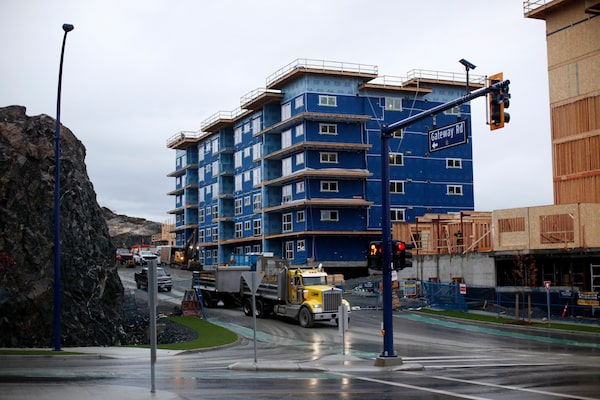
The NDP government initiated a development-approvals process review that has worked to identify the many factors that slow down housing construction.CHAD HIPOLITO/The Canadian Press
B.C. has introduced the first of what is a planned series of changes to make it easier to get approvals for new housing, part of a raft of measures aimed at tackling the province’s problems with upward-spiralling rents and prices for homes.
Municipal Affairs Minister Josie Osborne introduced new legislation Thursday that will simplify the process by exempting bylaw amendments from having to go through lengthy zoning processes if they conform to a city’s official community plan. The bill would also allow city staff to approve minor variances, rather than having to take them through council. Cities will have the option of whether to use those simplified processes.
“We’re facing a housing crisis and that requires all orders of government to work together,” Ms. Osborne said.
Housing, climate change, long a preoccupation for B.C., take centre stage in national vote
Provincial and civic governments are attempting to streamline housing approvals as part of the effort to grapple with B.C.’s decades-old challenge of housing-cost increases that are consistently outstripping any gains in household incomes.
Builders have complained for years that it’s taking longer and longer to get municipal approvals, as new regulations get layered on and public-hearing processes have become more and more contentious. That pushes up the cost of housing, as developers pay thousands or sometimes millions in holding costs while waiting.
A 2017 study by the Fraser Institute showed that approvals for new housing in the Lower Mainland took anywhere from five months (Langley and Pitt Meadows were at the low end) to as much as 18 months, with the longer times typical of projects in Vancouver and West Vancouver. At that time, it was estimated that “compliance costs and fees add up to a low of $4,300 per home built in Pitt Meadows and a high of almost $78,000 per home in the City of Vancouver.”
But even Surrey, typically seen as a pro-development municipality, was noted as a municipality that charges $15,000 more per unit to comply with land regulations than neighbouring Langley.
Things have only gotten worse since then, builders say.
“Things were already bad and the situation got much worse because of COVID,” said Ron Rapp, the chief executive officer of a group that represents Lower Mainland builders, HAVAN.
The NDP government in 2018 initiated a development-approvals process review that has worked to identify the many factors that slow down housing construction, a review that Mr. Rapp’s organization and many others participated in.
Ms. Osborne’s changes won’t apply to Vancouver, which operates under its own charter.
But staff in Vancouver have been working steadily to make improvements in recent months.
The development, building and licensing department has been coming to council every two months with changes aimed at reducing wait times, eliminating unnecessary or contradictory regulations, and generally making the process of getting an approval less painful.
Department general manager Andrea Law said the city now allows seven of eight permit types to be applied for and received electronically. It has also recently removed requirements for complicated approvals of simple commercial changes, like moving a dividing wall. Previously, that would have triggered major upgrades.
Ms. Law said the focus now is on helping small businesses to get back on their feet, as well as making a smoother path for one- and two-family residential projects.
Next, her department plans to move on the problems with bigger construction applications by the end of 2022 and to have a fully computerized system throughout the development system by 2024. That’s being helped along the way with a $15-million fund from the province to help cities upgrade their permitting systems.
Along the way, Vancouver’s department is going to have a new focus on what are now being called “the customers.”
“We need to be tracking from their point of view,” Ms. Law said. “We need to be able to measure customer time and staff time and … helping them move along.”
Surrey has also been taking action, with a recent council approval of a move to guarantee maximum turnarounds for building and rezoning permits, with a 10-week limit for approvals of a single-family home or a business tenant improvement.
We have a weekly Western Canada newsletter written by our B.C. and Alberta bureau chiefs, providing a comprehensive package of the news you need to know about the region and its place in the issues facing Canada. Sign up today.
 Frances Bula
Frances Bula